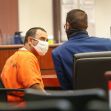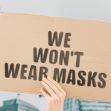Due to the COVID-19 pandemic, movie theaters closed down to help stop the spread. These closures have caused many movies to delay their release dates and left movie sets deserted. Some movie theaters did drive-in style movies in order to keep some type of revenue flow. Now, movie theaters are slowly reopening with restrictions like limiting the number of people allowed in theaters to allow for social distancing and requiring employees and customers to wear masks.
Movie production had pretty much come to a halt with the COVID-19 pandemic. Some production has started again. The rules for production are usually put forth in what are known as white papers prepared by the Alliance of Motion Picture and Television Producers (AMPTP) along with the Directors Guild of America, SAG-AFTRA, MPA and unions. However, different states, counties, and local governments also have guidelines, and they usually outrank those rules. These state, county, and local rules are usually not very specific and can contradict each other. For example, in California, the Music, Film and Television Production guidelines in California say that when making movies, the cast and crew should follow “safety protocols agreed by labor and management.” The state of Georgia “encourages film and television companies to develop strategies to support the health and safety of their cast and crew as production activity restarts” and only provides some general safety guidelines. Even the most thorough guidelines put forth in the white papers can be vague. For example, some say that there should “adequate ventilation of indoor locations.” However, there are no guidelines on what constitutes an indoor location or what is considered “adequate.” Therefore, it is tough to determine whether or not the rules are being followed.
However, at the end of August, the Producers Guild of America (PGA) released a 57-page guide with recommendations on how to navigate this “new normal” with suggestions on how to go about things like coronavirus testing, wearing masks and other personal protective equipment (PPE), and social distancing. The report states, “Before beginning pre-production, the production company must have an infectious disease safety plan and have conducted a risk assessment to address ways the COVID-19 hazard will be mitigated on the production.” Also, it is written that “It is recommended that production processes be altered to adapt for COVID-19, rather than adapting COVID-19 processes to existing production practices. This plan is to be communicated to every cast and crew member before beginning work on a production and employment is contingent on agreement to comply with the plan.” Since being informed of and agreeing to comply with COVID-19 safety measures are a part of accepting employment, actors and crew members cannot claim ignorance if they were fired for not complying and then try to sue.
Some of the guidelines given by the PGA say that the only people allowed to take off PPE are actors when they are on set and when they are “camera ready.” That means that due to the actors’ makeup, they will not be able to put PPE on again, even if they are off set. The only people not required to practice social distancing when the actors are not in PPE are the people in “Zone A” who have been preapproved to be on set by the producer or the safety officer. The report says that “Zone A individuals who are not cast must be in proper PPE AT ALL TIMES.” There are also guidelines on how sets should be cleaned every two hours. This time would further allow people who are wearing masks to take a break from wearing them and walk outside (while social distancing) and get some fresh air.
The movie industry is one of the many industries trying to reopen amidst the COVID-19 pandemic. Reopening comes with challenges, and the legal challenges the movie industry will face will become more apparent as time goes on.






